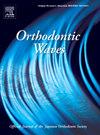Effect of sleep-disturbed breathing on maxillofacial growth and development in school-aged children
IF 0.5
Q4 DENTISTRY, ORAL SURGERY & MEDICINE
引用次数: 1
Abstract
ABSTRACT Purpose : In children, snoring and apnoea cause impairments in growth, cognitive function, attention, and school performance. In this study, we aimed to identify the association between craniofacial disharmony and paediatric sleep-disordered breathing. Materials and Methods : Forty-one patients with malocclusion (19 boys; 22 girls; mean age, 10.0 ± 2.1 years) were selected from our hospital. The relationship between maxillofacial morphology, pharyngeal airway form, and nasal respiratory function was examined using cephalometric analysis and skeletal patterns. All patients underwent portable monitoring with an overnight out-of-centre sleep testing protocol that could be performed at home using a portable computerized monitoring system. Results : The respiratory disturbance index was significantly greater in patients with mandibular retrusion than those with malocclusion. Arterial oxygen saturation and nasopharyngeal area were significantly smaller in participants with Class II malocclusion than in those with other types of malocclusion. Moreover, dental cast model analyses confirmed that patients with reduced transverse maxillary dimensions had a higher obstructive sleep apnoea syndrome (OSAS) risk than those with malocclusion. Therefore, patients with mandibular retrusion have a higher OSAS risk than those with other types of malocclusion. Conclusion : Childhood maxillofacial morphology may influence adult OSAS, and early treatment for children with OSAS may help prevent adult OSAS.睡眠呼吸障碍对学龄儿童颌面生长发育的影响
摘要目的:儿童打鼾和呼吸暂停会导致生长、认知功能、注意力和学习成绩受损。在这项研究中,我们旨在确定颅面不和谐与儿童睡眠呼吸障碍之间的关系。材料与方法:选择我院41例错牙合患者,男19例,女22例,平均年龄10.0±2.1岁。通过头影测量分析和骨骼模式检查了颌面部形态、咽气道形态和鼻呼吸功能之间的关系。所有患者都接受了便携式监测,该监测采用了夜间中心外睡眠测试协议,可以在家中使用便携式计算机监测系统进行。结果:下颌后倾患者的呼吸障碍指数明显高于错牙合患者。II类错牙合患者的动脉血氧饱和度和鼻咽面积明显小于其他类型错牙合的患者。此外,牙颌模型分析证实,上颌横向尺寸减小的患者比错牙合患者有更高的阻塞性睡眠呼吸暂停综合征(OSAS)风险。因此,下颌后倾患者的OSAS风险高于其他类型的错牙合患者。结论:儿童颌面部形态可能影响成人OSAS,早期治疗儿童OSAS有助于预防成人OSAS。
本文章由计算机程序翻译,如有差异,请以英文原文为准。
求助全文
约1分钟内获得全文
求助全文
来源期刊

Orthodontic Waves
DENTISTRY, ORAL SURGERY & MEDICINE-
CiteScore
0.40
自引率
0.00%
发文量
0
期刊介绍:
Orthodontic Waves is the official publication of the Japanese Orthodontic Society. The aim of this journal is to foster the advancement of orthodontic research and practice. The journal seeks to publish original articles (i) definitive reports of wide interest to the orthodontic community, (ii) Case Reports and (iii) Short Communications. Research papers stand on the scientific basis of orthodontics. Clinical topics covered include all techniques and approaches to treatment planning. All submissions are subject to peer review.
 求助内容:
求助内容: 应助结果提醒方式:
应助结果提醒方式:


